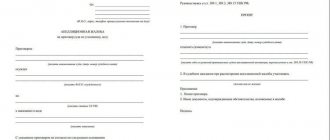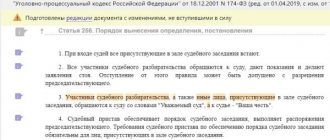The presentation of evidence to the court, the validity of which raises serious doubts among both the parties and the judge, is not uncommon. It often happens that when making a decision, such evidence is simply not taken into account, is regarded as improperly prepared, for example, without presenting the source of receipt, incorrectly certified, etc., in some cases, the decision directly indicates the unreliability of specific information. At the same time, those on whose initiative such documents were presented remain without the attention of law enforcement agencies. At the same time, Russian legislation provides for the liability of those guilty of providing false evidence, and the procedure for bringing to criminal liability has been determined.
Falsification of evidence under Art. 303 of the Criminal Code of the Russian Federation
This norm of criminal law is subject to application in the following cases:
1. if fabricated evidence is presented in a civil or administrative case: then the person who acted intentionally bears criminal liability, he can be either a participant in the process or his representative. There are situations when the representative may not know that the document is not genuine.
Example No. 1 . Kozlov A.M. entered into an agreement with lawyer A.E. Markin. for the provision of representation services in civil proceedings regarding reinstatement at work. Considering himself illegally dismissed, Kozlov A.M. handed over to representative Markin A.E. sick leave, which indicated the period coinciding with the absenteeism imposed by the employer, A.M. Kozlov himself. did not take part in the trial. During the proceedings, the defendant (the employer's representative) was able to prove that the sick leave was fake, since responses were received from the medical institution - Kozlov did not apply for medical care during the specified period. Subsequently, Kozlov was prosecuted under Art. 303 of the Criminal Code of the Russian Federation, and in relation to lawyer Markin A.E. no charges were brought against him for using forged documents, since no evidence of his knowledge was obtained.
2. if there is falsification in an administrative case, both the participant in the administrative proceedings and his representative, as well as the official who directly compiled the protocol or is considering the case of such an offense, may be involved.
Example No. 2 . The traffic police inspector drew up a report on the fact of crossing in the wrong place. Pedestrian Ivanov K.E. challenged this protocol, presented evidence to the court about the absence of a pedestrian crossing in the place where Ivanov was seen (the protocol indicated that there were zebra crossings 20 meters away). The court took Ivanov’s arguments into account, declared the protocol on an administrative offense illegal, and subsequently, at the request of Ivanov, the traffic police inspector was prosecuted under Art. 303 of the Criminal Code of the Russian Federation.
3. if the inquirer, prosecutor or investigator created and presented artificially created evidence that does not correspond to reality.
Example No. 3 . In relation to Grinyaev L.D. a criminal case was initiated under Art. 119 of the Criminal Code of the Russian Federation, regarding a threat against his boss E.N. Pigasov. During the proceedings in court, the interrogation protocol of L.D. Grinyaev was examined. dated 04/01/0217 as an accused, in which he admitted his guilt. Grinyaev L.D. stated that in the period from 03/23/2019 to 04/06/2019 he was not in the city, he traveled to the Republic of Azerbaijan for work, presented tickets and notes that he was at the conference every day for the entire period of absence. This interrogation protocol was found to be fictitious, and the person conducting the inquiry was convicted under Art. 303 of the Criminal Code of the Russian Federation.
4. if falsification of evidence occurs in a criminal case involving a serious or especially serious charge. For such actions Art. 303 of the Criminal Code of the Russian Federation provides for the most severe punishment - up to 7 years in prison.
Example No. 4 . Investigator Rebrov A.K. due to improper storage of material evidence, he lost it before the examination - blood samples on the clothes of the accused of committing murder were mistakenly transferred for research in another case, after which it was no longer possible to restore them. Fearing liability for malfeasance, the investigator agreed with one of the experts to fabricate a report stating that the samples were received and the blood on the defendant’s jacket coincided with the blood of the victim, which later became the main evidence of guilt. The defendant's lawyer insisted on requesting evidence and presenting it to the court for review, after which a re-examination was ordered, which revealed that the samples did not correspond to the stains on the clothes. After a thorough check, it was established that investigator Rebrov falsified physical evidence, replacing the lost samples with others obtained in an unknown way from an unknown person. Subsequently, Rebrov and the expert with whom he had an agreement were prosecuted for committing an official crime and falsifying evidence.
5. if the evidence is fabricated as a result of operational-search activities, when a citizen is being persecuted who is obviously not involved in the commission of any crime. We are talking about the illegal activities of operational authorized law enforcement officers (for example, the police department for solving economic, tax or other crimes), whose job is to collect primary materials to resolve the issue of initiating a criminal case.
Example No. 5 . The department for combating economic crimes took measures to establish fraud in the field of lending; a transcript of the conversation between the head of the bank’s credit department and a potential client was presented to the court. Based on the text of the transcript, the boss agreed to illegally issue a loan to a person in exchange for a reward. At the court hearing, the defense stated the need to listen to the audio recording in order to compare it with the text compiled by the operatives. While listening to the audio recording, it was established that the recording did not completely correspond to the printed text, which became the basis for bringing the police detective to criminal liability under Art. 303 of the Criminal Code of the Russian Federation. However, the defendants in the case were nevertheless convicted of committing a crime in the field of lending, since there was other evidence of their guilt.
Criminal cases of falsification of evidence (in any of the above options) are initiated and investigated by officials of the Investigative Committee of the Russian Federation. Therefore, if you are faced with fabrication, you need to prepare an application to the Investigative Committee.
Responsibility provided for in Art. 327 CC
Art. 327 of the Criminal Code contains 3 parts.
Part 1
Maximum punishment for forgery, production and sale of false documents (official signs):
- 2 years of restriction of freedom;
- 2 years of forced labor;
- 6 months detention;
- 2 years of imprisonment.
Part 2
If the actions specified in Part 1 contributed to the commission or concealment of another crime, the maximum sentence will be:
- 4 years of forced labor;
- 4 years of imprisonment.
Part 3
The maximum penalty for using false documents is:
- penalty:
- RUB 80,000;
- income for 6 months;
- 480 hours of compulsory labor activity;
- 2 years of corrective labor;
- 6 months arrest.
Appeal to the Investigative Committee of the Russian Federation
It is necessary to understand that filing a criminal complaint is a serious step associated with an accusation of committing an intentional crime. Therefore, you should write a statement about falsification of evidence only if there is reliable information about the deliberate falsification of evidence presented to the court. We should not forget about liability for knowingly false denunciation.
If you are sure that you are faced with the deliberate falsification of evidence and are determined to contact law enforcement agencies, you can use the following example:
To the Investigative Department of the Investigative Committee for the Ryazan Region, N.G. Pishchalova, living in Ryazan, st. Stroiteley, 20, tel. 9198888880
STATEMENT
I request that you be held criminally liable under Art. 303 of the Criminal Code of the Russian Federation Ignatov R.P., representative of the plaintiff in the civil case. Of course, we cannot say that it was the representative who was involved in committing the forgery (perhaps he was not informed by the plaintiff about the fabrication). At the same time, if the applicant is sure that a specific person needs to be prosecuted, he can indicate this in the appeal - during the verification, the degree of guilt of each person will be established, and the case can be initiated after the fact, without indicating the full name.
Ignatov R.P. in the interests of the principal Ryabin A.P. A claim was filed in the court of the Construction District of Ryazan for the recovery of funds in excess of the compulsory motor liability insurance payment in the amount of 250,000 rubles (the plaintiff had already received 400,000 rubles from insurance).
It is necessary to write what confirms the conclusion that there was an intentional falsification and not an honest mistake.
As one of the proofs of the validity of the claims presented, the representative of the plaintiff presented an auto technical examination report, which took into account the damage to the engine with repairs in the amount of 120,000 rubles. Automotive expert Ivanov N.N. summoned to the court hearing. explained that this conclusion was drawn up by him, but part of the text does not correspond to reality. So, Ivanov presented a copy of the examination, which remained with him, where there was no damage to the engine.
I believe that Ignatov R.P. deliberately misled the court by forging the signature and conclusions of the expert. During the court hearing, I announced falsification of evidence on the part of the plaintiff’s representative, and his copy of the examination was declared invalid.
Taking into account the above, guided by Art. Art. 144-145 Code of Criminal Procedure of the Russian Federation,
ASK:
Initiate a criminal case against Ignatov R.P. according to Art. 303 of the Criminal Code of the Russian Federation.
On criminal liability for knowingly false denunciation under Art. 306 of the Criminal Code of the Russian Federation warned. This phrase is required.
Attachment: a copy of the protocol of the court hearing, a copy of the fictitious examination, a copy of the genuine examination, copies of the claim and the court decision.
Pishchalov N.G., signature, number.
After submitting such an application, employees of the Investigative Committee are required to conduct an inspection (its duration is up to 10 days), during which the materials of the civil case considered in court are requested and studied. As a rule, after the initiation of a criminal case, a handwriting (or other, depending on the circumstances) examination of the document is prescribed.
In most cases, falsification consists of forging signatures, dates, etc. There are often situations when investigators have to order not a handwriting examination, but a study to determine how long ago a document was drawn up (for example, in order to establish the date of drawing up a receipt, a will, etc.).
In the sample application to initiate a criminal case, we reflected information about the applicant’s appeal to the judge about the illegal actions of the representative and about the exclusion of the examination as unreliable evidence. Let us clarify that filing such a petition directly in court, even if there is strong evidence of falsification, is a person’s right, not an obligation.
Thus, there are cases of contacting law enforcement agencies after the court has made a decision; this is not prohibited by law. At the same time, you need to understand that it will be extremely difficult to prove the fabrication of documents, because in many respects the initiation of a criminal case depends on the opinion of the court stated in the decision - whether the controversial evidence was accepted or rejected. Agree, if the decision indicates the authenticity of a dubious document, there are grounds to initiate a criminal case under Art. 303 of the Criminal Code of the Russian Federation may not exist. Based on practice, in extremely rare cases, a criminal case under Art. 303 of the Criminal Code of the Russian Federation is initiated in the presence of a decision that has entered into legal force, where the disputed evidence was recognized as reliable, and this always leads to a review of the court decision based on newly discovered circumstances in accordance with Art. 392 Code of Civil Procedure of the Russian Federation.
Read about how to apply for a review of a case based on newly discovered circumstances.
Thus, a statement in a civil proceeding that a party has presented inadmissible evidence does not lead to the initiation of a criminal case until the interested party separately contacts law enforcement agencies. The procedure for filing a statement about falsification during the consideration of a civil case as such is not provided for in the Code of Civil Procedure of the Russian Federation, but one of the norms (Article 186 of the Code of Civil Procedure of the Russian Federation) defines the actions of a judge upon receipt of a statement of falsification of evidence:
- the parties are explained the possibility of presenting other evidence;
- the court may order an examination to verify authenticity.
As follows from practice, the judge additionally explains the consequences of such a statement, as well as the right to apply to initiate a criminal case to law enforcement agencies.
It is necessary to dwell separately on the procedure for declaring evidence inadmissible in the arbitration process. The legislator, in more detail than in civil proceedings, regulates the actions of the court when a fact of unreliability or obvious falsification of documents is discovered.
Summary
Tampering with evidence is the deliberate distortion of important data or falsification of official documents that are considered in court. If the incident is discovered during civil hearings, the perpetrator will be held accountable under Part 1 of Art. 303 of the Criminal Code of the Russian Federation. He expects from 100 thousand rubles. fine before arrest for 4 months.
As practice shows, establishing the fact of falsification is a complex matter that will take a lot of your time and effort. Often, investigators fail to identify the perpetrator of the forgery and bring him to the deserved punishment. In the meantime, while the proceedings are ongoing, your property may already be resold several times. Therefore, if you suspect that your opponent is feeding the court false papers, we recommend that you immediately seek help from an experienced lawyer. A specialist will analyze the situation and suggest the correct course of action.f








